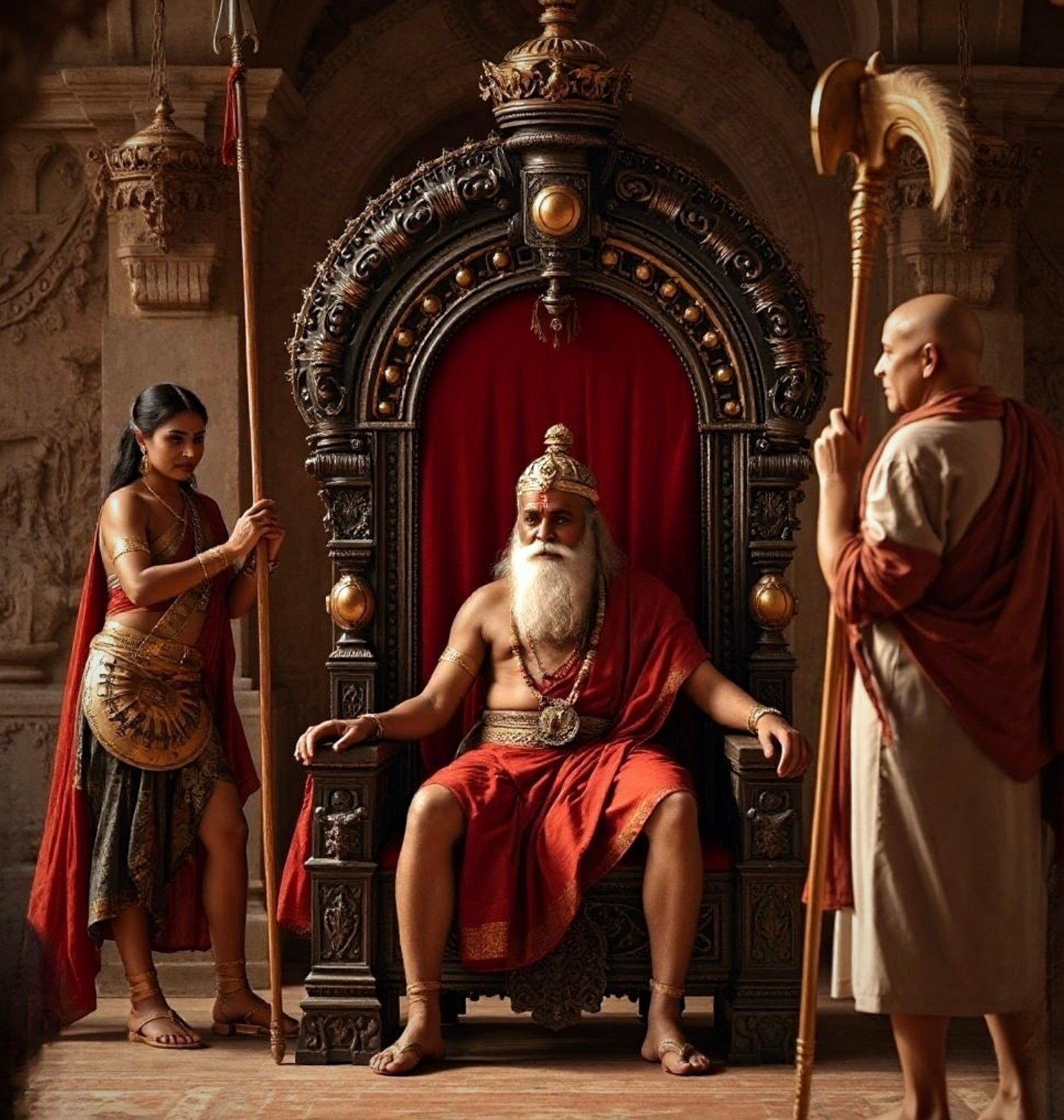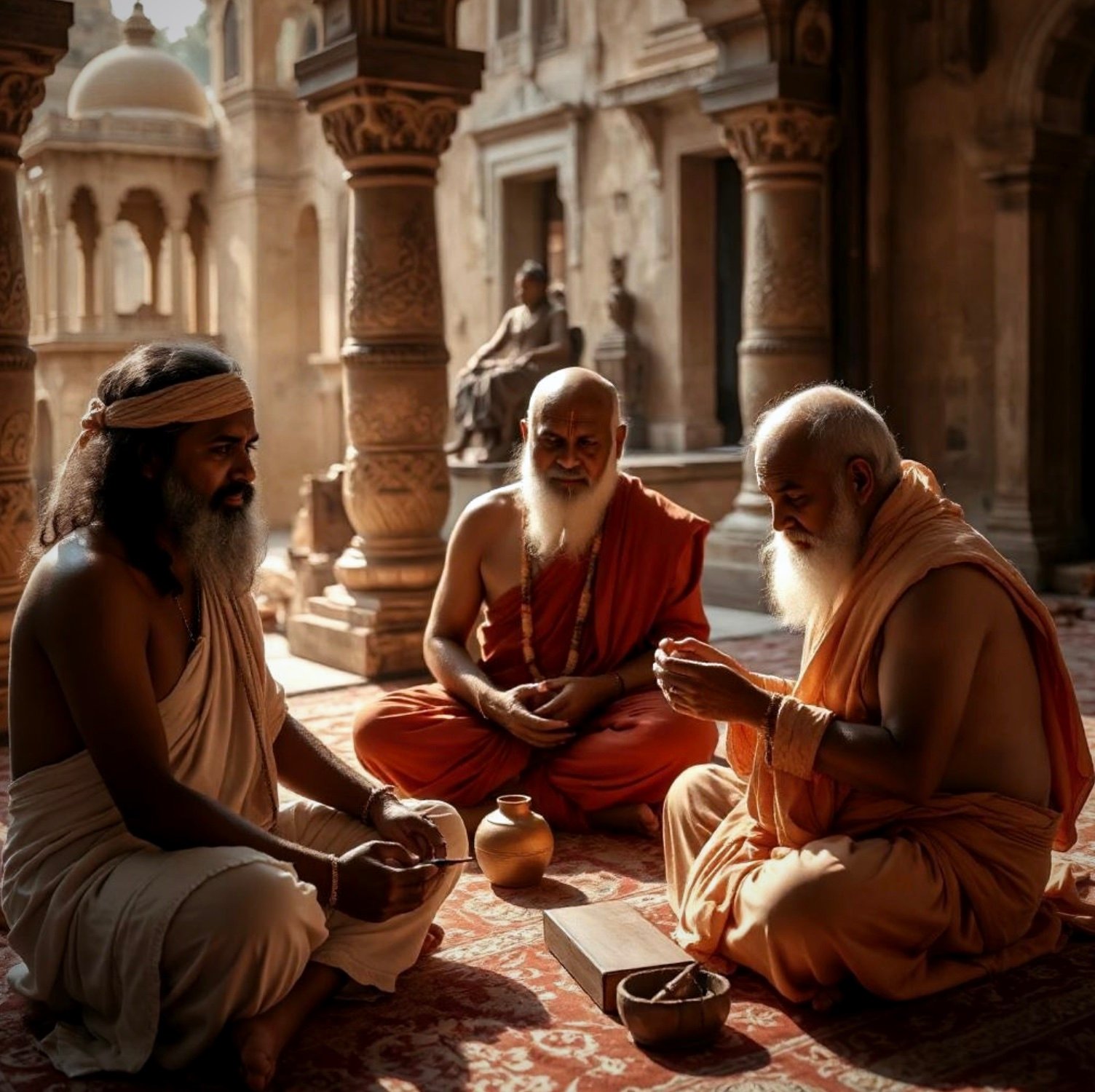India has produced many scriptures throughout her long civilization. Most of the better-known works deal with matters of the spirit and the bliss that comes from following the path of divinity. Every aspect of Indian life is informed by her civilization, affected by the pursuit of things of a divine nature. Any topic one wishes to engage in regarding India will manifest some aspect of the spiritual nature of humanity within the cosmos.
However, we must remember that India like anywhere else in the world is populated by humans despite the presence of the gods found everywhere in this land. Indeed the life of the spirit affects every aspect of Indian life and existence, so much so that one can hardly discuss Indian civilization without referencing divinity. While the attempt to create an otherworldly utopian society is important to Indians, perhaps more important than anywhere else, if we study the lives of such rulers as Ashoka, we, as well as the most dedicated Desi must admit that we are only human. We create societies with leaders whom we look to for inspiration and guidance, entailing the creation of laws and government that might hopefully be egalitarian and just for all.

Kingdoms rose and fell in India, as they did elsewhere. War was a normality, shared by every nation and region on Earth. Blood was as easily spilled on India’s plains in ancient times as it was in the Middle East, the rocky hills of ancient Greece or, the valleys of Mexico. Indian epics describe mass battles in detail, such as in the Mahabharata and the Ramayana, as well as the fate of both victor and vanquished. Just as no individual is immortal, no society is immune to war.
What is interesting is how societies all demonstrate, through the various philosophies and ideologies they produce, how our lot in life might improve somewhat. That said, we, as a race, have not been able to fully abandon war or abjure the intrigue and politics that go along with or support it. We might say that as death is inevitable, so is the act of making war. A utopian society that requires no rulers or an army may be a wonderful dream and vision, but so far, it has proven to be unattainable.
ALSO READ: Journey of Zero: India’s Gift from nothingness to infinity – THE NEW INDIAN
Among the numerous kingdoms that developed in ancient India, the era of Chandragupta (340-289 BC), the founder of the Mauryan Empire, stands out as one of the greatest and most powerful in India’s history. This king came to rule after the invasion of Alexander, the Macedonian king who engaged in battle against a local ruler named Porus on the banks of the Hydaspus River. Greek authors describe this encounter as the most difficult of his career.
Alexander decided to go no further into India, leaving a few officers to govern the conquered provinces. These Macedonians soon fell into disagreement, and Chandragupta saw his chance to seize power, defeating them in battle, acquiring their lands, and conquering other rival Indian kingdoms. Eventually, he went on to rule most of Northern India, building palaces, temples, shrines and institutions. His court was lavish, as he sat upon a royal throne protected by, according to the Greek chronicler Megasthenes, no less than 700 fierce female bodyguards known as the Shaktiki, each warrior the equivalent of any man.

Chandragupta fostered art, architecture, and literature. He commissioned texts for the study of spiritual and secular purposes. His prime minister, named either Chautila, Chanakya or Vishnagupta-perhaps these were three distinct personalities as nobody knows for sure-was appointed to oversee the compilation of a text created by a group of scholars knowledgeable in many areas known as the Arthashastra (The Science of Material Gain), a compendium of worldly affairs dealing with government, law, economics and political science that rivals Machiavelli’s The Prince, advising rulers to govern and maintain power by any means necessary.
This text was formally recompiled in the 3rd century AD, with some claiming the compiler then was named Chautila or Chanakya. The work, however, was so important that it was used as a guide for rulers in India up to the 12th century. Far from anything remotely democratic or egalitarian, like Machiavelli’s work, this text empowers rulers and goes so far as to instruct future kings how to fight wars, advising how to promote intrigue and cause confusion in the court of an enemy to create chaos in a rival society.
Every aspect of government is covered in the massive text, which consists of 3 divisions, 15 books and 150 chapters covering 180 topics. There are verses instructing how to govern and gain the admiration of the people, as well as how to intimidate and instill fear to subdue any possible usurpers. Any practices we might define as conniving or shady can be found in the text, which reads like a manual for criminality. Poisoning enemies or ordering their assassinations are considered the norm for the survival of an ancient king, codified as advice for future heirs.
ALSO READ: Nasadiya Sukta: Unique creation tale from Rig Veda – THE NEW INDIAN
One verse even advises the formation of a troupe of beautiful courtesans who are sent as concubines or wives to an enemy, who are in reality professional assassins skilled in murder. Indeed, books 7-13 of the Arthashastra deal with what was seen as a common occurrence in the ancient world- warfare, confronting enemies, and foreign diplomacy. Tactics and strategies are discussed as well as the use of various weapons, descriptions of armour, types of warrior units and other martial topics. The text was presumed lost by Western scholars since the 12th century but emerged in the early 20th century when a Brahmin priest from Tamil Nadu in South India produced a palm leaf page with a segment of the text written on it.

Subsequent verses were brought forth, and this piqued the interest of scholars worldwide. In 1919, German sociologist Max Weber studied the surviving texts of the book and claimed that the Arthashastra was ‘truly radical Machiavellianism’ as it reeked of exhortations to commit intrigue and mercilessly pursue goals against all odds, oppress rebellious subjects, and dispose of them if need be. The book represented the height of pessimism and negativity.
While at first glance we might agree with Max Weber, we also should notice a difference with the Renaissance Italian’s guide to power- nowhere does Machiavelli advise kings to regard the welfare of his subjects. He does not advise peace or negotiation; in fact, quite the opposite, Machiavelli suggests a ruthless approach to achieving goals. In Arthashastra, the Dharmic path is the highest form of enlightenment. A ruler should be well-versed in the personal application of spiritual sciences so he can become a just ruler. Nor does Machiavelli advise about maintaining forests, and caring for animals and the land. Both Machiavelli and Chautila do advise and warn of the pitfalls of compromising with other rulers, but for all his negativity, Chautila acknowledges the good in the world and even suggests, for the kingdom’s sake, empowering the common people.
ALSO READ: Prithvi Sukta: Dharmic homage to Mother Earth – THE NEW INDIAN
Interestingly, the Arthashastra advises kings to avoid war, for it is an expensive pastime. One can lose a war just as easily as one can crush enemies and win. Do what you must to avoid war, but when all fails, know what you are getting into. Here we see differences in comparing Machiavelli’s work. The Arthashastra tells us that the duty of a king is to be a just leader for his society and to balance power with a sense of compassion and understanding. Ancient kings already had the power to oppress or exterminate thousands if they so chose, but the question arises here as to what makes a pertinent king different. What will make a ruler stand out? What precautions can this leader take to at least offer a choice to a foe, even for his own benefit?
Life is a challenge. Politics and diplomacy indeed can be a dangerous game, and Indian philosophy acknowledges this clearly in the Arthashastra. We all do what we must in life to achieve our goals. But once again, Indian philosophy demonstrates that even far back in the age of Chandragupta, there is a code of dignity for rulers that goes beyond merely being a greedy, hungry amoeba. It is such examples that further inform us of the greatness of India, which will yet teach us how to be truly human.
Ismail Butera is a lifelong musician and historian, exploring the intertwining threads of ancient history, mythology, and world cultures through his project ‘Echoes Of Antiquity,’ blending composed recitations and traditional music from diverse civilizations.










